WiES sets out to support and inspire, mentor and socialise, empower and encourage
If you could offer your support to someone as a WiES mentor, or if you would like the support of one as a mentee, you can sign up to take part as either a mentor or a mentee (or both!) by contacting Lidunka (l.vocadlo@ucl.ac.uk). We will then make introductions between suitable mentors and mentees.
Jo Reynolds, Low Carbon Geophysicist BP.
Jo Reynolds graduated from UCL in 2014, after completing the MSci Geophysics course. After a year of travelling, she joined bp in September 2015 as a Geophysicist, starting up in the Aberdeen office. Here, she worked on the Schiehallion field, analysing world-class 4D seismic data to identify new wells to be drilled on the field, and subsequently leading the planning of two wells which were drilled by the Deepsea Aberdeen drilling rig. Following this work, and her leadership of the Aberdeen Graduate community, she won the Oil & Gas UK Graduate of the Year award in 2017. Since then, she has worked in various exploration teams and spent 7 months in bp’s central Carbon Ambition team, directly contributing to bp’s Net Zero agenda. Jo has recently pivoted from a hydrocarbon Geophysicist to a Low Carbon Geophysicist, working in bp’s Carbon Capture Utilisation and Storage (CCUS) Screening team.
Professor Carolina Lithgow-Bertelloni, Louis B. and Martha B. Slichter Endowed Chair in Geosciences, UCLA.
Professor Carolina Lithgow-Bertelloni's ProfileProf Lithgow-Bertelloni's research is geared towards understanding the connection between the dynamics of Earth's interior and their surface expression, including the influence of dynamics on surface deformation and topography. Research approaches to these questions include numerical simulations and experimental fluid dynamics.
Dr Frances Cooper, Senior Lecturer in the School of Earth Sciences, University of Bristol.
Frances Cooper graduated from UCL in 2003 with an MSci in Geology and then obtained a PhD on the exhumation of mid-crustal rocks in the Basin and Range province, Nevada from the University of Southern California in Los Angeles, USA.
Frances is now a lecturer at the University of Bristol and has been involved in a collaboration with the mining company, BHP, investigating tectonic controls on copper deposits in northern Chile and the western USA.
Frances Cooper's Profile
Dr Amy Edgington, Outreach Leader for the GeoBus, UCL.
Amy Edgington graduated from the University of Leicester with an MPhys in Physics with Astrophysics and then went on to obtain a PhD in mineral physics from the Earth Sciences department at UCL. Following a short post-doctoral position at UCL she went on to train as physics teacher and now leads the GeoBus UCL outreach project developing and delivering workshops to school students across the country.
Amy Edgington's Profile
Kate Henderson, Chief Executive of the National Housing Federation (NHF).
Kate Henderson has a BSc in Geology from UCL, graduating in 2002, and a MSc in Environmental Technology from Imperial College, graduating in 2005. Kate is a highly regarded commentator on housing and urban policy, and is involved in a number of government panels and independent commissions including the government’s Rough Sleeping Advisory Panel. Since 2018 Kate has been Chief Executive of the National Housing Federation (NHF). Prior to joining the NHF Kate was Chief Executive of the Town and Country Planning Association (TCPA). While not working in earth sciences, Kate still loves geology and is passionate about tackling the housing crisis, inequality and climate change.
Antonia Hawker, Noise and Vibration Scientist at the Health and Safety Executive.
Dr Martha Pamato, Marie Skłodowska-Curie Actions (MSCA) fellow, University of Padua.
Martha Pamato is a mineral physicist studying the behaviour of minerals under Earth’s deep mantle conditions. With an interdisciplinary geological background, she combines experimental and theoretical methods with the study of natural specimens, to understand global geodynamics and the evolution of Earth into a habitable planet. Martha graduated from the University of Padua (Italy) with a B.Sc. in Geological Sciences in 2008. She then moved to Germany where she obtained both her M.Sc. (2010) and PhD (2014) in Experimental Geosciences at the Bayerisches Geoinstitut, University of Bayreuth. As a Postdoctoral Research Associate she spent a year in the United States at the University of Urbana-Champaign (IL) and then moved to the University College London (UCL) in 2015. At UCL she investigated changes in material properties just prior their melting, the so-called pre-melting effects, with implications to the Earth’s core and the evolution of our planet. Martha was awarded a Marie Skłodowska-Curie (MSCA) fellowship in 2018 and moved to the University of Padua (Italy) in 2019 to study unique natural samples from the deep Earth, i.e., sulphide inclusions in diamonds, which are the key tool to date diamond formation via Re-Os isotopic analyses.
Dr. Shevenell is an Associate Professor of Geological Oceanography at USF College of Marine Science.
Dr. Shevenell is an Associate Professor of Geological Oceanography at USF College of Marine Science. She received her PhD in Marine Science in 2004 from the University of California Santa Barbara. In 2005, she was awarded a Program on Climate Change postdoctoral fellowship at the University of Washington. In 2007, Dr. Shevenell moved to the United Kingdom, where she was an Assistant Professor in Earth Sciences and Geography at University College London. She joined the USF faculty in 2011. Dr. Shevenell's research focuses on generating high-resolution geochemical and micropaleontological (foraminifera) records from marine sediments to address questions related to Earth's climate evolution over the last 65 million years. Amelia Shevenell's Wikipedia Page
Dr Grace Campbell, Earthquake Geologist and Remote Sensing Specialist in Arup's Natural Hazard and Risk Management Team, London.
Dr Grace Campbell is an earthquake geologist and remote sensing specialist in Arup's Natural Hazard and Risk Management Team, London. She works with engineers and scientists to better quantify and mitigate the impacts of earthquakes, landslides, tsunamis, floods and climate change on people and places. Grace assessed the impacts of the 2016 Kumamoto earthquakes, Japan as part of the Earthquake Engineering Field Investigation Team and worked with the United Nations Office for Project Services to help develop a remediation and regenerative engineering design for an area of Freetown, Sierra Leone, that was devastated following a fatal landslide in 2017. Before joining Arup, Grace completed a Masters in Remote Sensing and Environmental Science and a PhD in continental earthquake hazard, focussed on assessing active faulting in Central Asia.Dr Grace Campbells Profile
Dr. Emma Bowden, Geomodelling Specialist for the Abu Dhabi National Oil Company Technical Centre.
Dr. Emma Bowden lives in Abu Dhabi, with her husband and son, and works as the Geomodelling Specialist for the Abu Dhabi National Oil Company Technical Centre.Emma graduated from UCL in 2002 with a BSc, and a PhD in Geology. She had an 18-year international career with Schlumberger living and working in various locations including Scotland, Eastern Europe, the UAE, and Ecuador. For most of her Schlumberger career she worked as a Geomodelling Consultant for numerous Oil and Gas Companies, building 3D sub-surface reservoir models for predicting hydrocarbon reserves, and for oil and gas field development planning.
She joined ADNOC Onshore in 2020 as a part of their Technical Centre team to train and mentor their technical staff, and to advise and develop technical Standard Operating Procedures and Standards for Geomodelling within ADNOC.
Emma enjoyed her time at UCL and studied alongside people she is happy to be friends with 20 years later. She feels one of the most important lessons she learnt from her time there, was that is important to find a place of study or work where you feel you fit in, and you and your colleagues support one another.
Agathe Detanger, Environment Engineer.
I am Agathe Detanger, a french UCL Environmental Geoscientist alumni. After completing 4 years at UCL, I have no doubt that my studies have played a key role in giving me the tools to be a confident and forward thinking woman in science. After graduating in 2020, I started my career as a Environmental Engineer at Veolia Environmental Services working on a landfill site in Hong Kong (SENT Landfill). In a few months I will be moving to Surabaya, Indonesia, to work on a plastic recycling facility and I expect many wonderful opportunities and challenges to come! I am very pleased to be a part of the WiES team and look forward to exchanging thoughts and experiences around UCL, London and getting started in the working world!
Harriet Jarlett runs communications for the European Space Agency's research and development programmes.
Harriet Jarlett runs communications for the European Space Agency's research and development programmes. Her work includes producing and editing news items and annual reports, coordinating conferences, and building engaging media campaigns to promote ESA's future technologies. Prior to this, Harriet worked at CERN as both a science writer and web editor, where she was particularly proud of the In Theory campaign, which highlighted physicists and brought theoretical physics into the spotlight. Harriet's background is in Earth Science, she completed her first master's degree in Geology at UCL in 2010, before undertaking a second masters in Science Communication from Imperial College London. Her first role was as content engagement manager for NERC.
Chaneil James, freelance scientific journalist for Physics World magazine.
Chaneil James completed her BSc in Earth Sciences at University College London (UCL), where her final year geosciences project was titled “The Evolution of Mercury’s Core”. During her time at UCL she volunteered as a VIP chaperone for the CogX Festival 2018, as well as for events hosted by NAAUT and the London Space Network. She also worked as the community coordinator for NASA FDL/FDL Europe, and a student intern at CERN. This provided her the opportunity to help host a GOGO Talk in collaboration with James Parr of FDL. Currently studying an MS in Astrophysics, Particle Physics, and Cosmology at the University of Barcelona, Chaneil's thesis looks at the use of neural networks to determine the importance of biosignatures in exoplanetary atmospheres on the possibility of life elsewhere in the Milky Way. Believing in making science accessible for all has played a major role in Chaneil's career. Whilst completing her masters, Chaneil was the Head of Sponsorship at Edinburgh Women in Space for their March 2021 event. She is currently a freelance scientific journalist for Physics World magazine, diversity coordinator for UK Students for the Exploration and Development of Space (UKSEDS), subject matter expert for the NASA SpaceApps Hackathon events, and the founder of AstroNoir.
Professor Sophie Nowicki, Empire Innovation Professor, Department of Geology, University at Buffalo.
Sophie Nowicki graduated from UCL in 2007 with a PhD in Theoretical Glaciology from the Earth Science Department and the Center for Polar Observation and Modeling (CPOM). She then became a civil servant at NASA Goddard Space Flight Center. In 2020, Sophie moved to the Department of Geology at the University at Buffalo. She studies how ice sheets interact with the global climate system and in particular affect sea level change, using a combination of applied mathematics, remote sensing observations and numerical modeling. The numerical models that she uses span the spectrum of idealized models to large-scale continental ice sheet models. Key to her work are climate models, since they are key for providing climatic forcing for ice sheet model, such as the Ice Sheet Model Intercomparison Project for CMIP6 (ISMIP6).Professor Sophie Nowicki's Profile
Gayle Hough, Senior Geohazard Specialist, BP
Gayle Hough has a MSci in Geology from UCL and a MRes in Marine Geology and Geophysics from the National Oceanography Centre, Southampton, graduating from the latter in 2006. Her masters research was on understanding the processes and depositional characteristics of giant gravity flow deposits offshore northwest Africa, after which she had a desire to apply her training to practical problems outside of academia.
After spending a number of years as a geohazard consultant, working first for Halcrow, an engineering company, and then RPS Group, Gayle moved to bp where she is now a Senior Geohazard Specialist. This work involves looking at natural geological processes that may present a direct or indirect risk to offshore operations and people. This includes assessing the potential geohazard risks whilst planning a well in an O&G or CCUS project, or identifying potential shallow geohazards to foundation conditions, ahead of a windfarm installation. Geohazards is relevant to every offshore project that interacts with the seabed, so her work spreads right across the bp portfolio. This means every day and every project is different, getting involved in work from all around the world in a variety of settings. Gayle is also part of the STEM Ambassador programme, inspiring children and young people to consider a career in STEM through delivering workshops and careers talks.
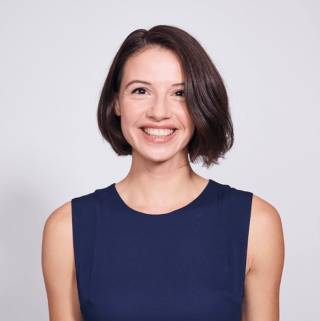

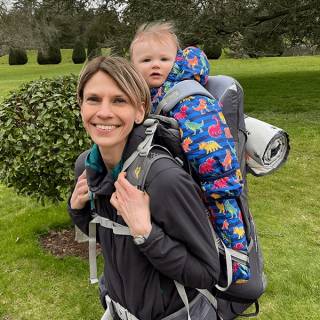
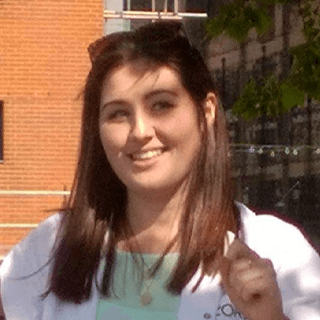
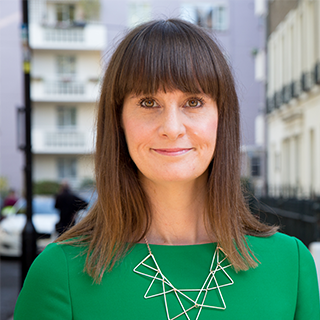
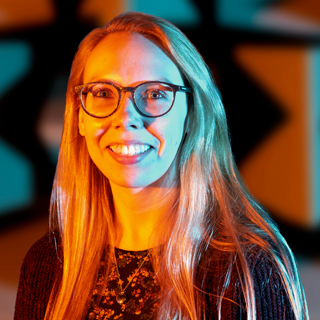







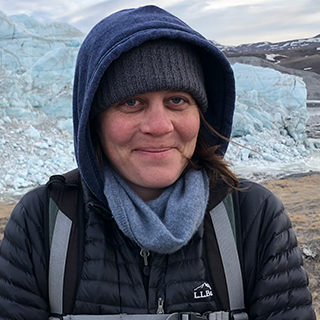

 Close
Close

